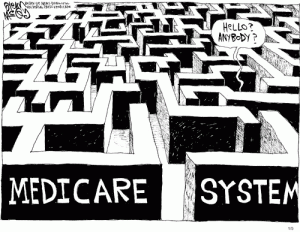Some senior living companies operate with their own version of zero tolerance and it leads to terrible results.
Once or twice a month there is a news story about an insane zero tolerance discipline incident at a school that results in the suspension or expulsion of a student (often grade school age) for chewing a sandwich in the shape of a gun or a kid going bang bang on the playground. We read these stories, shake our heads and wonder how school leaders can have so little common sense. While the reasons for zero tolerance are sound, blind implementation is just plain ridiculous . . . more than ridiculous it is destructive. It has gotten so ridiculous and embarrassing that the Obama administration has recently called for schools to get rid of zero tolerance. Some senior living companies operate with their own version of zero tolerance and it is an easy trap to fall into.
Senior Housing and Zero Tolerance
A while ago I was talking to an executive director who recently moved from a small, family-owned, regional chain to one owned by a large national chain. At the family-owned company he had a great deal of autonomy and, while there were policies and procedures, they were minimal and crafted in such a way as to allow executive directors a great deal of flexibility in how they ran their buildings. His biggest frustration in making the transition to the national chain was the amount of bureaucracy he had to deal with. This bureaucracy falls into two categories:
- Policies and procedures that allow very little flexibility in how the building is run. In particular he found there were lots of things he hadn’t been doing that he was now required to do and others that he had been doing and were working well for the community that he had to stop doing, not for any particular reason except policy.
- Getting approval for anything took multiple steps and multiple forms which made it more difficult to have face time with residents, family and staff.
I suspect most of these policies were created in reaction to someone doing something boneheaded in a company community. The idea being that a policy will keep that thing from happening again. I would like to suggest this approach completely misses the mark:
- People occasionally do stupid things. In fact I bet somewhere sometime even you have done something stupid. Just because something stupid happens it does not mean a policy is needed. Rather it may mean that person needs better training on something specific or, more likely, better training on how to think about things. Or perhaps that person needs to be let go.
- Having a big book of policies and procedures can lull you into thinking you can hire less competent people.
- Having an environment where local management has no autonomy is discouraging to great leaders. If a great candidate joins an organization like this they will either shut down and stop trying, or they will leave for more promising opportunities. I predict that the person I was talking with will move on in less than a year.
- It sends a message to staff, up and down the chain of command, that meeting the minimum standards of the policy and procedures book is good enough. It takes away the incentive to go the extra mile.
Well run buildings stay full, have happy residents and staff, make a good profit and don’t get sued. The reason they are well run is not because there are volumes of policies and procedures that are followed, but because, starting with the executive director and continuing all the way down to the housekeeping and food service staff, they have great relationships with residents and families.
Next Up: How the right culture is the best inoculation against being sued. Steve Moran
If you like this article (or even if you don’t) it would be a great honor to have you subscribe to our mailing list HERE.









With respect to the article on zero tolerance, I agree that a policy is not the answer to every mistake, and zero tolerance often defies common sense. Unfortunately, our society’s propensity to file a lawsuit over even trivial matters has caused our attorneys and insurance companies to strongly “suggest” that we have policies in place for even those trivial matters.
While working as a Divisional Director for an industry-leading Care Provider, I oversaw 24 memory care communities across 11 states. And, in this role – it became painfully obvious that the larger the Parent Company Grew the more the autonomy was sucked out of the local level management. Thus, strong & capable executive directors – grew bored/uninspired very quickly and moved on. And, less competent, in-experienced ‘rule followers’ replaced them. This unfortunate dynamic has enormous impact on the entire organization and most notably on the direct care of the residents and the satisfaction of the families. I too, left my role – as the strangle-hold impaired me as well. I just find this such a completely unfortunate direction for Senior Living to be going. Much like Big Gov’t – when something grows too large with too many levels/layers of administrative oversight….it opens the door for those with no leadership, no creativity and no accountability – to become the ‘norm.’ And, certainly – as the Senior Living clients shift from the Greatest/Silent generation to the Baby Boomers/activist generation…..the industry will be exposed as the new clients will most certainly not tolerate.
I understand the need for large organizations to have specific policies and procedures to maintain consistency and hopefully minimize lawsuits. This is taught in business schools and works well for companies like McDonald’s. When you go to any McDonald’s in the country, the food will consistently look and taste the same.
sThis may work great for french fries and hamburgers, but to provide quality care for seniors and keep families satisfied, it can’t be best accomplished by “box-checking robots” who focus on following minimum standards. The type of personality of what I picture as an ideal senior care leader requires flexibility, creativity, compassion and the ability to build trust and relationships with employees, residents and their families. These are qualities that can’t be trained or mandated by policies and procedures. Managers with this type of personality often feel confined and unappreciated in a corporate cultures which don’t allow for and reward creativity and independent thinking.
I agree that there is such a thing as too many policies. In my previous position, the SNF had a 4 inch (overstuffed) ring binder that was just nursing policies! Not only did staff not know all the policies, they didn’t even try to find them because by the time they did, it was often too late.
That said, I don’t think it is wise to go too far in the opposite direction. There is a great deal of oversight we all deal with in this business and unfortunately it only takes one negative episode by one employee to cause regulatory and legal nightmares. Granted, having policies is no guarantee that they will be followed but leadership involves guidance and that’s really what a well-crafted policy is all about. A policy that works communicates expected outcomes while leaving some room for the path to those outcomes.
A great article! It echoes everything our organization stands for! Corporations and chains rely too much on policy-filled binders that no one ever looks at! It seems as if some entities have tried to restrain their managers and dumb-down the day-to-day operation of the communities!
Several years ago, I was out-of-town on business. I went to a restaurant down the street from the hotel for dinner. Being a Friday night, the place was packed. Fortunately, a seat opened up at the bar. While having dinner, I become engaged in conversation with the couple sitting next to me. As it turns out, their mother had been a resident of one of the affordable assisted living communities that BMA manages. Their only regret, they said, was that Mom, because of her health, was only able to live in the community for six months.
Hearing that I was from the management company, the woman hesitated before continuing. She did not want to get anyone in trouble. I know you have a policy about tray service and I understand why the policy says residents need to come to the dining room for meals unless they have an illness that requires they stay in their apartment. Because of Mom’s health, there were times she did not feel up to leaving her apartment. On those occasions, a meal always seemed to find its way into her apartment.
She went on to say that Mom liked to have these Little Debbie cupcakes on hand in her apartment. When her supply would be running low, a staff member was always willing to buy her some more. I want to assure you, she said, the staff member volunteered to this this on his or her own time.
Then she added that because Mom was in the process of dying, there were times she would get scared. A staff member always seemed to find the time to sit and comfort Mom when this happened.
As a company, we spend a lot of time and effort talking about how residents are to be every staff members #1 Priority. Stories such as this one illustrate the impact that this can have on the quality of life for residents and their families.